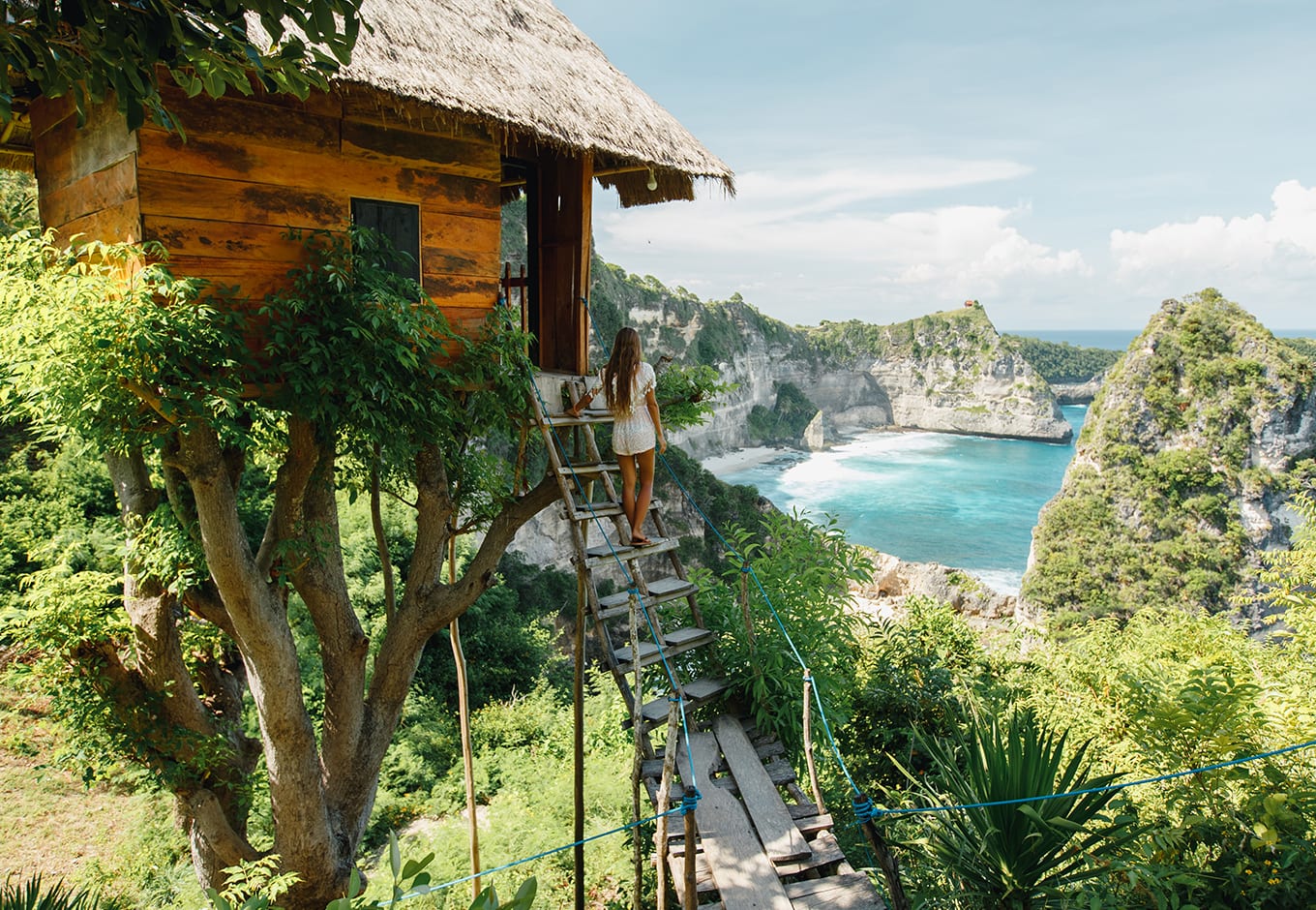Luxury travel is always changing, and this time it is for good. It is not about limousine shuttles to the airport, piles of towels, and high-pressure showers anymore. As a customer-oriented industry, hoteliers and other travel service providers must consider the needs and wants of customers. More and more high-earning customers are aware of sustainability issues concerning the travel industry. Thus, demand from luxury travelers shapes the change in the sector – and does so with positive effects.
Who are the luxury travelers?
You may think of luxury travel as accessible to a selected few. Industry leaders, however, suggest the luxury traveler as we know it is just a part of the luxury travel sector, often mixed with other traveler “tribes”. As Amadeus puts it, the “Reward Hunters” or conventional luxury seekers. They prefer self-indulgent travel and seek a reward for hard work in other areas of life. Reward hunters are usually mixed with other two traveler tribes, simplicity searchers and obligation meters.
Hence, the one willing to pay for easy planning and travelling, and the ones going on business trips, family gathering or other events, such as weddings.
Regarding the regional distribution of travelers, luxury still resides in West, with North America and Western Europe accounting for 64% of outbound luxury trips, although it makes up only 18% of the world’s population. The largest growth prospects of luxury travel are being given to South Asia, Southeast Asia and Emerging Europe, with all three surpassing 8% growth in terms of CAGR in 2015 to 2025.
Why are luxury travelers’ changing preferences important?
Given the variety of luxury travel, you may already guess that the sector is not that small. Neither in terms of the number of travelers nor dollars spent on their trips.
Hard data confirms the increasing importance of luxury travel. According to Amadeus, luxury travel is growing faster than overall travel. The driver of luxury travel is not that distinct factors driving the general travel industry. The rise of travel expenditure can be explained by experiential spending positively correlating with society enrichment.
What is Luxury Travel all About?
Customer segments, age, values and attitudes are changing. Consequently, these changes manifest themselves in luxury. It is no more all about high-class dining, or a number of pools available.
“As the average consumer becomes older (as it is in Western Europe and North America), luxury becomes more about enrichment than materialism” said Ian Yeoman, Travel Futurologist. Luxury travel is traditionally defined by high service level, high product quality standards, and exclusiveness. Unique or niche services are coupled with privacy and security.
So, where is the change?
Targeting Wellness
First, the change is related to demographics. Dominating markets of Western Europe and North America constrained with aging. Thus, more and more travelers are willing to spend on wellness travel. From SPAs to sports competitions to resorts, wellness is expected to shape high-end travel.
Transformative travel was a travel trend of 2018 that continues in 2019 and beyond. Travel experiences empower people to make meaningful and lasting changes in their lives. Health-conscious travelers are simply spending more time and dedication to take care of their bodies and minds. As per Alison Gilmore, the ILTM’s Portfolio Director “every trip is expected to enhance the physical, mental and social wellbeing of the traveler, transformation is the very promise of travel(..)”
Greening Travel
The growing awareness of environmental issues and the promotion of sustainable actions in Western Europe and North America is likely to cause the emergence of luxury travelers preferring sustainable and conscious travel over mass tourism. Conscious travel, just like the previously mentioned wellness travel trend is related to and arises from transformative travel, namely the expectation of travel to change and transform traveler’s everyday life and give a new outlook on life upon returning back home. As Lindsey Ueberroth, CEO of Preferred Hotels & Resorts puts it in her interview to travel news agency Skift, ”Conscious travel, I believe, is taking the idea of transformative travel to a new level (..)It’s about human rights and sustaining communities, and not just about sustainability.” It is indeed the trend to travel with the local communities in mind. However, the accessibility to experiences that are promoting human rights, community sustainability, and others, are not always accessible to a mainstream traveler, as the gap of interconnected travel service providers still poses a problem of accessing information and making the product quality and service level available for most of the travelers.
Authenticity over Resort Pampering
The third trend of luxury travel changes is authentic travel. The authentic experience has emerged as one of the major factors defining luxury. From visiting silk factories to shopping in the local farmer’s markets and learning how to cook paella, travelers now want to taste, do, make and indulge in the authentic, local lifestyle, as well as visit sights off the beaten track, more frequently choosing to hike instead of laying in resort poolside area sipping cocktails. As per John Bevan, the COO of Spafinder Wellness, “We’re seeing a lot of luxury travelers wanting a connection with local customs and nature. People want a break from their crazy busy lives(..)”
A good example of the authentic travel experience being a new luxury is the Italian designer’s Salvatore Ferragamo S.p.A.’s cooperation with Tuscany Again, a non-profit curating a selection of luxury travel experiences. Although the owners of Ferragamo are running a hotel e Lungarno Hotel Collection for years, the incentive of luxury travel to be connected with the non-profit offering authentic experiences, such as truffle-picking, olive oil pulling, and a visit to jeweler or leather craftsman to learn and make their customer necklace or bag is something new, influenced by the growing demand from the luxury travel sector.
Apart from satisfying their customers’ needs, the incentive also tackles one of the most pressing tourism problems in European metropolises, hence the over-tourism. With experiences available to travelers year-round, in regions and rural areas as well as urban centers, travelers can now travel more comfortably, and not be concerned with the effects of mass tourism emerging of their travel choices. In the interview to Skift, Ferragamo said, “Our goal is to create an ecosystem of the highest quality, to fight mass tourism and create meaningful journeys of discovery.”
Knowledge is the New Luxury
Apart from authentic travel experiences, sustainable choices, and other trends, one of the emerging trends is of travelers seeking not only cultural but also educational enhancement. Knowledge and personal growth are one of the main pillars of transformational travel, thus making the travel experience truly life-changing and allowing for advancement in personal and professional life.
A good example of education coupled up with hospitality is the partnership between TED talks and the Marriott hotel chain. “We are delivering a series of original content, events, and experiences that will spark travelers’ creativity and inspire new perspectives,” said Matthew Carroll, vice president, and global brand manager, Marriott Hotels. And as you may know, creativity, new perspectives, and ideas are the fast track to a permanent change in lifestyle.
How the Travel Industry Can Benefit Local Communities
While the fast growth of the travel industry is sometimes blamed for having negative impacts on local communities, the environment and other spheres, there are several potential benefits to the changes in luxury travel trends.
The travel industry, in general, can have a positive impact on local communities by educating and raising public awareness on the local environment, and the importance of protecting it. This is a case with the Great Barrier Reef, for example.
Another great and usually travel -industry promoted effect of the industry is the economic and social contributions with hospitality industry creating employment and business in the area.
Apart from the previously mentioned positive impacts, the currently built hospitality industry buildings are being redesigned to fit the needs of both residents and international visitors, including building better transport, sanitary and other infrastructure.
How the Needs Translate into Sustainable Impact
For hospitality impacts are usually divided into aesthetic, cultural social, ecological, and political effects, we are taking this approach to explore the benefits of changing the luxury travel sector.
Aesthetic Impact
Aesthetic values are often underrated, as those can almost never be evaluated in quantitative terms. Although impossible to evaluate, threats of loss of aesthetics are important to locals, as it results in economic losses due to a decline of the overall value drop of the destination.
Therefore, the damage of aesthetics, such as incompatible hotel styles from different decades with distinct architectural aesthetics is lessened by current travelers’ preferences for authentic travel experiences, more and more preferring home-sharing accommodations and less modern accommodation housing.
These preferences, in return, allow preserving the traditional housing and buildings, and not to ruin the historical areas with new buildings. Due to traveler demands, local governments tend to limit attendance of natural sights in high season.
Cultural Impact
Cultural impact is directly derived from travelers’ preferences for authentic travel experiences. As the demand for preserving cultural heritage grows, local governments tend to support sustainable tourism, especially stressing the social and cultural perspectives of it. Heritage-based urban revalorization can in return generate green employment and stimulate local development.
According to United Nations, sustainable and authenticity-seeking luxury travelers also facilitate dialogue and tolerance, building bridges amongst nations, countries and ultimately leading to less discrimination based on gender, race, religious views or other characteristics. Thus, the change in the demand of those who usually are blamed for sustaining inequality is benefitting local communities in ways used to hurt.
Ecological Impact
Regarding ecological impact, the authenticity-seeking and sustainability-seeking travelers prefer to book sustainable and green hotels, which tend to be independent, local enterprises instead of large hotel chains. This in return allows the smaller and green, environment-friendly businesses to take off, saving water, electricity, using less polluting cleaning substances, and contributing to other factors leading to more green and ecological approach accommodation industry.
Apart from accommodation greening, positive ecological impact in the form of sustaining ecosystems is also present due to the decline in over tourism to selected nature parks in high seasons. Animals and insects can sustain their natural habitat, thus allowing the whole ecosystem to survive.
Educational and awareness-raising events, such as TED talks also allow locals to gain knowledge, which can then be applied to tackle some of the ecological problems in the area.
Social Impact
Positive social effects are closely intervened with economic effects, in most cases referring to the lower unemployment and higher business activity. While lower unemployment can be attributed to the whole hospitality industry, higher business activity is usually traced to a higher number of small local businesses or individuals taking advantage of tourist inflows. The business activity is directly correlated with travelers seeking authentic, off-the-beaten-path experiences, staying far from tourist hotspots.
Better local facilities, preserved heritage, and organization of frequent social events are amongst other positive effects, which can, however, be traced back to luxury travelers mostly in cases of smaller towns.
Conscious Travel is the New Luxury with its Perks for All
As seen in the previous years, luxury travel is turning from cocktail-sipping by the pool and limousine shuttles to diamond hotels into the authentic, conscious, and self-growth-oriented sector. Transformational travel, a megatrend already in 2018, is taking it to the next level in 2019, demanding authentic, environmentally-friendly experiences concerned with physical wellness and stimulating mentality through workshops and conferences.
The change of perception of luxury, communities, and nature in travel destinations can benefit in ways it could not before. Increased awareness of customer demands makes governments preserve natural sights, restrict construction to appeal aesthetically. In terms of positive cultural impacts, exposure to different attitudes towards race, religious views, gender equality, and others, allow building a less discriminatory environment, bridging nations, and states. The ecological preferences directly stimulate hoteliers to offer sustainable hotels, whilst social impact goes hand in hand with economic developments and political action to attract more tourists to less populated, rural areas.
Overall, travel is still one of the major sources of negative impacts, but with the ongoing change of perception from high-spenders, the whole offering to any kind of traveler across America, Europe, and Asia is expected to change, ultimately improving the sustainability of travel.
You might also like:
Age is NOT a travel barrier
CuddlyNest Team Travel Bucket List
Luxury Travel is Greening Hospitality Industry




